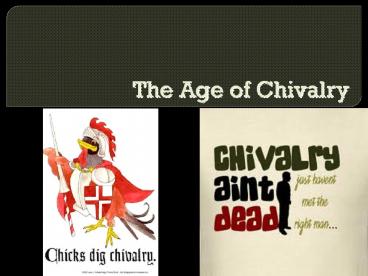The Age of Chivalry PowerPoint PPT Presentation
Title: The Age of Chivalry
1
The Age of Chivalry
2
The Age of Chivalry
- The code of chivalry for knights glorified combat
and romantic love - Chivalry has shaped modern ideas of romance in
Western cultures
3
Terms to know
- chivalry
- tournament
- troubadour
4
Where youve heard these terms
- Cavalier and chivalry both come from the French
chevalier which means knight
- The final four is the nickname of the NCAA
basketball tournament
5
Knights become an important part of battle
- Charles Martel organized the Frankish army into
troops of armored horsemen, knights. - The development of the saddle and stirrups made
it easier to fight on horseback.
The knight is still seen as a symbol of war and
battle 1000 years later
6
Feudal lords raise private armies
- Knights were given fiefs (plots of land) in
order to protect feudal lords from other nobles
trying to take their land - By granting the knights fiefs, the knights were
able to use the wealth of the land to buy
weapons, armor and warhorses - A knight typically served in 40 days of battle
per year
7
Chivalry
- Chivalry is a complex set of ideas which demanded
that a knight fight bravely in defense of three
masters - His earthly feudal lord
- His heavenly lord
- His chosen lady
8
Chivalry
- The chivalrous knight also protected the weak and
the poor - The ideal knight was loyal, brave and courteous
- Reality brutal to lower classes..
- Many knights failed to live to these standards
9
Literature of Chivalry
- Love poems and songs
- Troubadours traveling poet-musicians at the
castles and courts of Europe - They composed short songs about the joys and
sorrows of romantic love
- Epic poetry
- King Arthur
- Charlemagne
Troubadours then and now.
10
Epic Poetry
- The Song of Roland is one of the most famous
medieval poems - It praises a band of French soldiers who dies in
a battle under Charlemagne
11
Shifting Role of Women
- Church viewed women as inferior to men
- Feudalism develops ? Women status declined
- Roles limited to home and convent
- Endless labor, bearing children, family care
12
Women Power
- Women Power
- Feudal system allowed women to inherit land
- Send knights to war upon lords request
- Acted as military commander/warrior
- Dressed/fought as knights
- Did NOT receive fiefs as rewards for fighting
- Lords passed down land to sons, NOT daughters
13
Primary Sources Noble Women
- Contrast the daily life of a noblewoman to the
daily life of a peasant woman in the Early Middle
Ages (p. 368). - Identify at least TWO things that noblewoman and
peasant women had in common (p. 368). - Under what circumstance could a noblewoman become
lord of the manor and assume the duties that
come along with that title? (p. 369).
14
Tournaments
- Sons of nobles began training for knighthood at a
young age - After a year or two of training, they entered
mock battles called tournaments
Trumpets blared and lords and ladies cheered.
Tournament winners could demand large ransoms
from defeated knights.
15
Bloody Battles
- Unlike tournaments, actual battles were quite
violent and bloody - Castle battles are among the most bloody
The home of the lord and lady, a castle under
siege was a gory sight. Defenders poured boiling
water, hot oil or molten lead while archers on
the roof fired arrows and bolts at attackers.
16
Castle Weapons
- A Siege Tower had a platform on top that lowered
like a drawbridge - It could support soldiers and weapons
- A Battering Ram was made of heavy timber with a
sharp metal tip - It swung like a pendulum to crack castle walls or
knock down a drawbridge
17
Trebuchet
- A Trebuchet worked like a giant slingshot
- It propelled objects up to a distance of 980 feet
(More than 3 football fields)
- A Trebuchet was used to launch
- pots of burning lime
- boulders
- severed human heads
- captured soldiers
- diseased cows
- dead horses
18
Castle and Siege Weapons
- A tortoise moved slowly on wheels and sheltered
soldiers from falling arrows.
- A mangonel flung huge rocks that crashed into
castle walls. It propelled objects up to 1300
feet.

